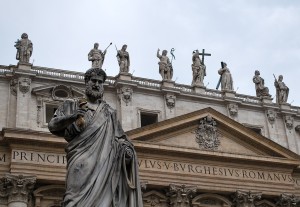Saint Valentine: Love and Injustice
We live in an unjust world. No one knows this better than St. Valentine, the man for whom the holiday we’re celebrating is named.
Legend has it the priest refused to obey Roman Emperor Claudias’ decree forbidding marriages. Claudias believed more men would be willing to join the army and go off to war if they remained single. Believing Claudias’ decree to be unjust, Valentine secretly officiated weddings anyway.
Valentine’s defiance resulted in his eventual execution. According to the story, his last act in prison was to write a letter to the jailer’s daughter, whom he had fallen in love with. He signed the letter “From your Valentine.” Since then, he has been associated with love and romance.
From what I can tell, there’s no way to know how much of the legend actually happened. But the story rings true because it’s happened so many times in the history of the world.
The martyred priest isn’t the first to die for his convictions, nor will he be the last. I think of the sacrifice he made to follow his conscience and serve the God he loves and wonder how the world can be so upside down.
 Then I remember another sacrifice, one well-documented and recorded in four books of the New Testament—One who spilled innocent blood so that a ragamuffin like me could live lavished in His mercy and grace. Immediately before guards arrested Him, He prayed that we would know how much God loves us (John 17:23). It’s mercy and grace I don’t deserve. The ultimate injustice.
Then I remember another sacrifice, one well-documented and recorded in four books of the New Testament—One who spilled innocent blood so that a ragamuffin like me could live lavished in His mercy and grace. Immediately before guards arrested Him, He prayed that we would know how much God loves us (John 17:23). It’s mercy and grace I don’t deserve. The ultimate injustice.
In the commercial age of cheesy greeting cards, plastic hearts, and tinfoil-wrapped chocolate, all of us are bombarded with the message that love is paramount. What’s harder to remember under all the noise is the origin of love—Who created it, and why.
We, being created in the image of God, know how important love is because that’s hardwired in us. It’s more than a human emotion; it’s a God-given character trait that can grow like a muscle—the more we use it, the bigger it gets.
Our ability to love, even to the point of death as Saint Valentine did, is proportionate to our understanding of God’s love for us. If we don’t feel loved, we operate under a scarcity mindset. (Can’t give it away, or there might not be enough left for me!)
When we learn to tap the unlimited power of God’s love, like Jesus did at Gethsemene, we can pour ourselves out without fear. For it is only then that we understand what comes after the pouring out—a supernatural transformation of ultimate weakness (death) to something so powerful no enemy could stop.
I’m still early in that learning process, but much farther than I’ve ever been. My prayer this Valentine’s day is that I would grow to understand God’s love so well that I no longer fear what people may say or do.
What about you? How has growing in the knowledge of God’s love helped you to love more? I’d love to continue the conversation—please comment below. Thanks!



No Comments